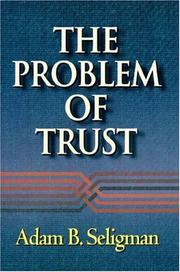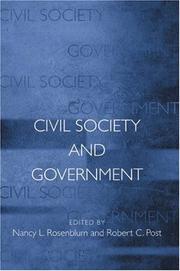| Listing 1 - 5 of 5 |
Sort by
|
Book
ISBN: 9780231212793 9780231212786 9780231559560 Year: 2024 Publisher: New York, N.Y. Columbia University Press
Abstract | Keywords | Export | Availability | Bookmark
 Loading...
Loading...Choose an application
- Reference Manager
- EndNote
- RefWorks (Direct export to RefWorks)
Book
ISBN: 9039106770 Year: 1997 Publisher: Kampen Kok Agora
Abstract | Keywords | Export | Availability | Bookmark
 Loading...
Loading...Choose an application
- Reference Manager
- EndNote
- RefWorks (Direct export to RefWorks)
In deze bundel staat het denken over 'de ander' en 'het anders-zijn' in het werk van een twintigtal auteurs/filosofen vanaf de 17e eeuw centraal. In het eerste deel komen vrouwelijke denkers aan bod, die de problematiek van de verhouding ik/ander vanuit een sociaal-politiek en ethisch perspectief hebben belicht. Het zijn onder andere Belle Van Zuylen, Mary Wollstonecraft, Simone De Beauvoir en Carol Gilligan. Het tweede deel van het boek belicht een aantal literaire filosofen en 'denkende dichters' waaronder Julia Kristeva, Hélène Cixous en Virginia Woolf. Het laatste deel behandelt tenslotvooral twintigste-eeuwse denkers, van wie het denken cirkelt rondom de begrippen alteriteit, pluraliteit en (seksuele) differentie. Het gaat onder meer over het werk van Hannah Arendt, Sarah Kofman en Luce Irigaray. Bij elke behandelde auteur is een korte biografische schets en een beknopte bibliografie opgenomen.
Philosophy --- Thematology --- General ethics --- Beauvoir, de, Simone --- Schurman, van, Anna Maria --- Cixous, Hélène --- Zuylen, van, Belle --- Conway, Anne --- Wollstonecraft, Mary --- Astell, Mary --- Arendt, Hannah --- Benhabib, Seyla --- Duras, Marguerite --- Bruggen, van, Carry --- Andreas-Salomé, Lou --- Kristeva, Julia --- Weil, Simone --- Gilligan, Carol --- Woolf, Virginia --- Irigaray, Luce --- Feminism --- History --- Feminist theory --- France --- Filosofie --- Vrouwen --- Kofman, Sarah --- Feminist philosophy --- Feminist sociology --- Theory of feminism --- Vrouw --- Oudheid --- China --- Romeinse Rijk --- Hellenisme --- Griekenland --- Hellas --- Film --- Literatuur --- Muziek --- Schilderkunst --- Tekenkunst --- Vlaanderen --- Vlaams --- Emigratie --- Kunst --- Ondernemerschap --- Poëzie --- Ethics --- Writers --- Book
Book
ISBN: 9053526277 Year: 2000 Publisher: Amsterdam Boom
Abstract | Keywords | Export | Availability | Bookmark
 Loading...
Loading...Choose an application
- Reference Manager
- EndNote
- RefWorks (Direct export to RefWorks)
Het werk van de Duits-Amerikaanse filosofe Hannah Arendt (1906-1975) biedt volgens de auteur vruchtbare aanknopingspunten voor de actuele discussie binnen het feminisme over de conflictueuze relatie tussen het streven naar autonomie en de erkenning van heteronomie. In Een bewuste paria presenteert de auteur vier spraakmakende filosofes van nu die in discussie zijn met het werk van Arendt: Seyla Benhabib, Françoise Collin, Bonnie Honig en Drucilla Cornell. Hun interpretaties van Arendt worden toegelicht en van kritisch commentaar voorzien. De verschillen in hun visie op Arendt hangen samen met hun verschillende opvattingen over begrippen als autonomie, identiteit en subjectiviteit.
Philosophy --- Butler, Judith --- Arendt, Hannah --- Cornell, Drucilla --- Benhabib, Seyla --- Collin, Françoise --- Honig, Bonnie --- Feminist theory --- Political science --- Feminism --- Feminist philosophy --- Feminist sociology --- Theory of feminism --- Political philosophy --- Blücher, Hannah Arendt, --- Bluecher, Hannah Arendt, --- Ārento, Hanna, --- Arendt, H. --- Arendt, Khanna, --- ארנדט, חנה --- アーレント, ハンナ, --- Filosofie --- Feminisme --- Arendt, H --- Filosofie : secundaire teksten --- Oudheid --- China --- Romeinse Rijk --- Hellenisme --- Griekenland --- Hellas --- Film --- Literatuur --- Muziek --- Schilderkunst --- Tekenkunst --- Vlaanderen --- Vlaams --- Emigratie --- Vrouw --- Theory --- Book

ISBN: 0691050201 0691012423 1400822378 1400813360 9780691050201 9780691012421 Year: 2000 Publisher: Princeton (N.J.): Princeton university press,
Abstract | Keywords | Export | Availability | Bookmark
 Loading...
Loading...Choose an application
- Reference Manager
- EndNote
- RefWorks (Direct export to RefWorks)
The problem of trust in social relationships was central to the emergence of the modern form of civil society and much discussed by social and political philosophers of the early modern period. Over the past few years, in response to the profound changes associated with postmodernity, trust has returned to the attention of political scientists, sociologists, economists, and public policy analysts. In this sequel to his widely admired book, The Idea of Civil Society, Adam Seligman analyzes trust as a fundamental issue of our present social relationships. Setting his discussion in historical and intellectual context, Seligman asks whether trust--which many contemporary critics, from Robert Putnam through Francis Fukuyama, identify as essential in creating a cohesive society--can continue to serve this vital role.Seligman traverses a wide range of examples, from the minutiae of everyday manners to central problems of political and economic life, showing throughout how civility and trust are being displaced in contemporary life by new "external' system constraints inimical to the development of trust. Disturbingly, Seligman shows that trust is losing its unifying power precisely because the individual, long assumed to be the ultimate repository of rights and values, is being reduced to a sum of group identities and an abstract matrix of rules. The irony for Seligman is that, in becoming postmodern, we seem to be moving backward to a premodern condition in which group sanctions rather than trust are the basis of group life.
Political sociology --- Political systems --- Social psychology --- #SBIB:35H501 --- 316.47.052 --- Bestuur en samenleving: netwerken, inspraak, participatie, interactief beleid --- Vertrouwen in sociale relaties --- 316.47.052 Vertrouwen in sociale relaties --- Social role --- Role, Social --- Social interaction. --- Trust. --- Social role. --- Social interaction --- Trust --- Human interaction --- Interaction, Social --- Symbolic interaction --- Trust (Psychology) --- Social status --- Exchange theory (Sociology) --- Psychology --- Attitude (Psychology) --- Emotions --- Agape. --- Appadurai, Arjun, "ed. --- Arendt, Hannah. --- Axial chasm. --- Banfield, Edward. --- Benhabib, Seyla. --- Bernstein, Basil. --- Boden, Deirdre. --- Bynum, Caroline. --- Calvinism. --- Cambridge Platonists. --- Catholicism. --- Christianity. --- Constant, Benjamin. --- Diderot, Denis, "ed. --- Douglas, Mary. --- Durkheim, Emile. --- Elias, Norbert. --- Frankfurt, Harry. --- Ghana, Frafas people of. --- Grief, Avner. --- Harrison, Bernard, "ed. --- Herman, Gabriel. --- Kahneman, Daniel. --- Lasch, Christopher. --- Macfarlane, Alan. --- Maza, Sarah. --- Merton, Robert. --- Otto, Rudolf. --- Protestantism. --- Puritanism. --- asceticism. --- associational life. --- baptism, private. --- capitalism. --- citizenship. --- civility. --- communitarianism. --- confidence. --- contract law. --- credit, symbolic. --- divorce. --- expectation, trust as. --- externality. --- familiarity. --- friendship. --- game theory. --- honor. --- incivisme. --- marriage. --- networks, of trust. --- postmodernity. --- Rol social. --- Interacción social. --- Interaction sociale --- Role (Sociology) --- Confiance --- Rôle social

ISBN: 0691088012 0691088020 0691228396 Year: 2002 Publisher: Princeton (N.J.) Princeton university press
Abstract | Keywords | Export | Availability | Bookmark
 Loading...
Loading...Choose an application
- Reference Manager
- EndNote
- RefWorks (Direct export to RefWorks)
Civil Society and Government brings together an unprecedented array of political, ethical, and religious perspectives to shed light on the complex and much-debated relationship between civil society and the state. Some argue that civil society is a bulwark against government; others see it as an indispensable support for government. Civil society has been portrayed both as a independent of the state and as dependent upon it. This book reveals the extraordinary diversity of views on the subject by examining how civil society has been treated in classical liberalism, liberal egalitarianism, critical theory, feminism, natural law, Christianity, Judaism, Islam, and Confucianism. The volume draws on the work of eminent scholars to address six questions: In terms of function and consequences, does it matter where the line is drawn between civil society and the state? What is the relationship of civil society to the state? In what contexts and under what conditions should government interact with individuals directly or instead indirectly through communal associations? What are the prerogatives and duties of citizenship, and what is the role of civil society in forming good citizens? How should a society handle the conflicts that sometimes arise between the demands of citizenship and those of membership in the non-governmental associations of civil society? A theoretical introduction by the editors--political theorist Nancy Rosenblum and legal scholar Robert Post--and a conclusion by religious ethicist Richard Miller, tie the book together. In addition to Rosenblum, the contributors are Kenneth Baynes, David Biale, John Coleman, Farhad Kazemi, John Kelsay, William Galston, Will Kymlicka, Tom Palmer, Fred Miller, Susan Moller Okin, Peter Nosco, Henry Rosemont, Steven Scalet, David Schmidtz, William Sullivan, Max Stackhouse, Stephen White, and Noam Zohar.
Civil society. --- State, The. --- Société civile --- Etat --- Civil society --- State, The --- #SBIB:17H3 --- #SBIB:321H30 --- #SBIB:324H20 --- 400 Overheid --- PPS --- Administration --- Commonwealth, The --- Sovereignty --- Political science --- Social contract --- Politieke wijsbegeerte --- Hedendaagse politieke en sociale theorieën (vanaf de 19de eeuw): algemeen (incl. utilitarisme, burgerschap) --- Politologie: theorieën (democratie, comparatieve studieën….) --- Political science. --- Anabaptism. --- Augustine. --- Benhabib, Seyla. --- Butler, Judith. --- Calvinism. --- Centissimus Annus. --- Constant, Benjamin. --- Cuddihy, John Murray. --- Dignitatis Humanae. --- Durkheim, Emile. --- Elshtain, Jean. --- Evans, Sarah. --- Ferguson, Adam. --- Frankfurt School. --- Friedman, Milton. --- Gaudium et Spes. --- Grotius, Hugo. --- Hardin, Russell. --- Hayashi Shihei. --- Ibn Rusd. --- Itō Jinsai. --- John Paul II (pope). --- John of Viterbo. --- Khatami, Mohammed. --- Kymlicka, Will. --- Leibowitz, Yeshayahu. --- Linbeck, George. --- Lipsius, Justus. --- MacKinnon, Catherine. --- Marsilius of Padua. --- Medina Constitution. --- Neuhaus, Richard. --- Okin, Susan. --- Oldfield, Adrian. --- Pateman, Carole. --- Peale, Norman Vincent. --- Planitz, Hans. --- Plato. --- Pufendorf, Samuel. --- Quadragesinio Anno. --- Rawls, John. --- Roberts v. Jaycees (1984). --- Sadanobu, Matsudaira. --- Saint Ambrose. --- authoritarianism, in Islamic world. --- casuistry. --- city-state: aim of (Aristotle). --- corporatism. --- institutions: in civil society. --- pluralism, of civil society. --- revolution (Locke). --- Civil government --- Government --- Political theory --- Political thought --- Politics --- Science, Political --- Social sciences
| Listing 1 - 5 of 5 |
Sort by
|

 Search
Search Feedback
Feedback About UniCat
About UniCat  Help
Help News
News